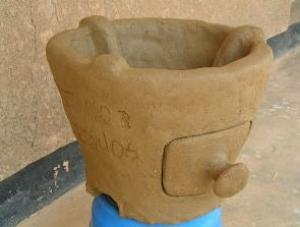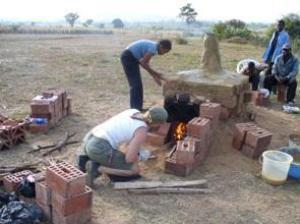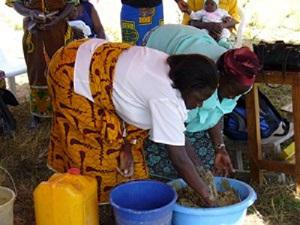Mary Ngozi Molokwu
Other projects
This project will create awareness on conservation at the community level and promote sustainable utilization of resources through the production and use of fuel-efficient stoves.

Finished stove.
This project is aimed at promoting rural involvement in identifying and solving community and environmental related problems. The first phase of the project will involve carrying out a questionnaire survey to understand the attitudes and perception of members of the support-zone communities on the establishment of the Amurum Forest Reserve, Laminga. Consequently, meetings will be held with members of these villages to discuss the outcome of the questionnaire survey. Major problems and needs will be addressed and both community members and resource persons will brainstorm on possible solutions. Afterwards a workshop on the impacts of forest exploitation will be held with selected participants, where the effects of deforestation and importance of sustainability will be presented. Case studies of the success of rural participation in different localities will be shown. This should lead participants to come up with their own ideas.

At the end of this workshop two conservation groups will be formed. One group made up of 14 people will receive training on environmental education and communication to teach and increase conservation awareness within the community. The second group of 30 people, mainly women will participate in a stove-making workshop. They will be taught how to produce and market fuel-efficient stoves as an alternative to the 3-stone (tripod) firewood use, thereby using forest products more sustainably. Expertise will be sought among locals in pottery and brick-laying. Local resources and techniques will be utilised in stove production.

An exercise on indigenous knowledge will also be carried out by both groups, where participants will carry out a plant identification exercise. Both fuel and medicinal plants will be identified and their uses noted. This is to identify which plants could be used to establish firewood farms, where wood can be harvested for stove use. Trees will be planted along roads leading to one of the communities that have been ruined by erosion to prevent further damage. It is expected that the environmental education and communication group will be a local conservation group under the community development arm of the A. P. Leventis Ornithological Research Institute (APLORI) and will serve as a communication medium between APLORI (managers of the forest) and the communities (custodians of the forest). An evaluation of members of this group will include observing them educate a selected group of people from these communities.